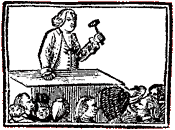 On 6 May 1772, Boston held its annual town meeting to elect representatives to the Massachusetts General Court.
On 6 May 1772, Boston held its annual town meeting to elect representatives to the Massachusetts General Court. Boston had four seats in that legislature while no other town in the province had more than two. Nonetheless, because Boston was so much larger than other towns, its population was underrepresented.
That town meeting was a special sort on the annual schedule because of the property requirement for General Court elections. White men didn’t have to own so much to vote for town officials in March and on town issues throughout the year.
The selectmen called for attendees to vote by noon, and then the town clerk, William Cooper, recorded the results this way:
The Votes being brought in the number of the same were found to be Seven hundred & twenty three, and upon sorting them it appeared that the four following Gentlemen were chosen, Vizt.Cushing, Hancock, and Adams had been Boston’s legislative representatives for a few years. Phillips, as I discussed last month, was a replacement for James Otis, Jr.
The Honble. Thomas Cushing Esq. - - - - 699
The Honble. John Hancock Esq. - - - - 690
Mr. Samuel Adams. - - - - - - - - - - - 505
William Phillips Esq. - - - - - - - - - - 668
But those four men weren’t necessarily the only candidates. In his diary, the merchant John Rowe recorded how many votes he won in General Court elections from 1765 to 1768, always coming up short. Yet Cooper never listed Rowe as a candidate in those years, thus avoiding an official record of his failure. So it’s possible other men were in the running in 1772 but didn’t match Adams’s 505 votes.
TOMORROW: The story behind the results.
No comments:
Post a Comment